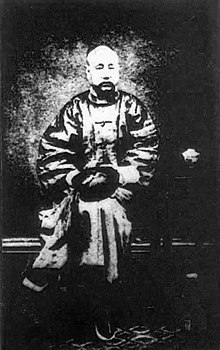Sengge Rinchen
| Sengge Rinchen | |
|---|---|
 |
|
| Jasagh and Prince of the Second Rank of the Horqin Left Back Banner | |
|
In office 1825–1865 |
|
| Monarch |
Daoguang Emperor Xianfeng Emperor Tongzhi Emperor |
| Preceded by | Suotenamuduobuji |
| Succeeded by | Boyannamohu |
| Personal details | |
| Born | 1811 |
| Died | 18 May 1865 (aged 54) |
| Resting place | Gongzhuling Village, Sijiazi District, Faku County, Liaoning Province, China |
Sengge Rinchen (Mongolian: ᠰᠡᠩᠭᠡᠷᠢᠨᠼᠡᠨ Sengerinchen, Chinese: 僧格林沁; Tibetan: སེང་གེ་རིན་ཆེན།, 1811 – 18 May 1865) was a Mongol nobleman and general who served under the Qing dynasty during the reigns of the Daoguang, Xianfeng and Tongzhi emperors. He is best known for his role at the Battle of Baliqiao during the Second Opium War and his contributions in helping the Qing Empire suppress the Taiping and Nian rebellions.
Sengge Rinchen was from the Horqin Left Back Banner in Inner Mongolia and was a member of the Borjigin clan. He was a 26th generation descendant of Qasar, a brother of Genghis Khan. His name is made up of two Tibetan words, "Sengge" (Tibetan: སེང་གེ་) and "Rinchen" (Tibetan: རིན་ཆེན་), which mean "lion" and "treasure" respectively. When he was a child, he was adopted by Suotenamuduobuji (索特納木多布濟), a jasagh of the Horqin Left Back Banner and junwang (郡王; Prince of the Second Rank) under the Qing Empire. He inherited his adoptive father's position and princely title in 1825 during the reign of the Daoguang Emperor.
...
Wikipedia
